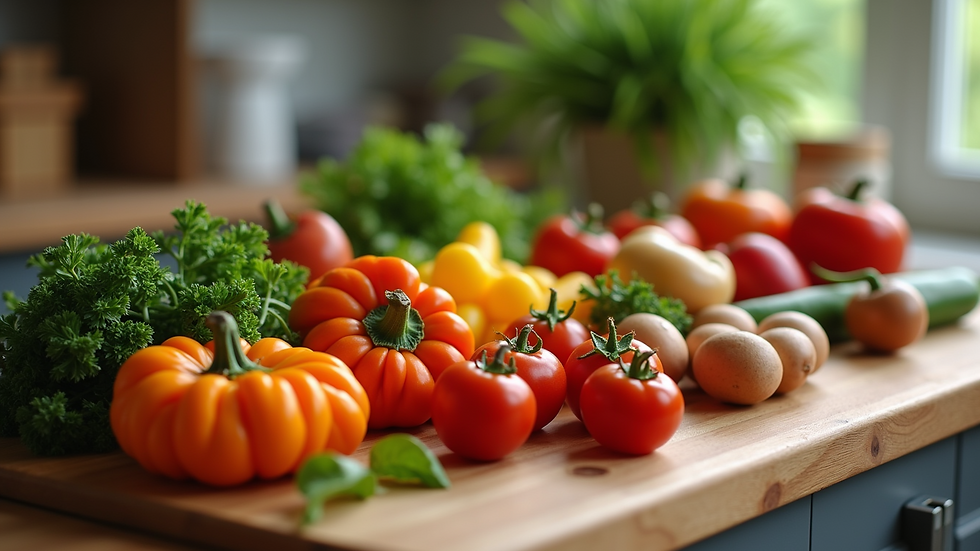Nurturing Emotional Intelligence Through Cooking Adventures
- chefcjack
- 5 days ago
- 4 min read
Cooking is more than just a means to satisfy hunger; it is a powerful tool for nurturing emotional intelligence. Engaging in cooking adventures can foster creativity, enhance communication skills, and build empathy. In this blog post, we will explore how cooking can be a transformative experience that nurtures emotional intelligence in individuals of all ages.

Understanding Emotional Intelligence
Emotional intelligence (EI) refers to the ability to recognize, understand, and manage our own emotions while also being able to recognize, understand, and influence the emotions of others. It encompasses several key components:
Self-awareness: Recognizing one’s own emotions and their effects.
Self-regulation: Managing emotions in healthy ways.
Motivation: Harnessing emotions to pursue goals.
Empathy: Understanding the emotions of others.
Social skills: Building relationships and managing conflict.
Developing emotional intelligence is crucial for personal and professional success. Cooking can serve as a practical avenue for enhancing these skills.
The Connection Between Cooking and Emotional Intelligence
Cooking involves a variety of emotional and social interactions. Here are some ways cooking adventures can nurture emotional intelligence:
1. Enhancing Self-Awareness
When cooking, individuals often reflect on their feelings and preferences. For example, choosing a recipe that resonates with personal memories can evoke nostalgia and self-reflection. This process encourages individuals to explore their emotions and understand what influences their choices.
2. Promoting Self-Regulation
Cooking requires patience and focus. Following a recipe involves managing time and resources effectively. When things don’t go as planned—like burning a dish or forgetting an ingredient—individuals learn to cope with disappointment and frustration. This practice of self-regulation can translate to other areas of life, helping individuals manage stress and setbacks more effectively.
3. Fostering Empathy
Cooking with others, whether family or friends, creates opportunities for collaboration and understanding. Sharing the kitchen space allows individuals to practice empathy by considering others' feelings and preferences. For instance, accommodating dietary restrictions or preferences demonstrates care and understanding, which strengthens relationships.
4. Building Social Skills
Cooking together is a social activity that enhances communication skills. It requires clear instructions, teamwork, and problem-solving. Engaging in cooking adventures can help individuals learn to express their thoughts and feelings more effectively, leading to improved interpersonal relationships.
5. Encouraging Creativity
Cooking is an art form that encourages creativity. Experimenting with flavors, textures, and presentations allows individuals to express themselves. This creative outlet can boost confidence and self-esteem, essential components of emotional intelligence.
Practical Cooking Adventures to Enhance Emotional Intelligence
Now that we understand the connection between cooking and emotional intelligence, let’s explore some practical cooking adventures that can nurture these skills.
1. Family Cooking Night
Organizing a family cooking night can be a fun way to bond and enhance emotional intelligence. Here’s how to make it effective:
Choose a Theme: Select a cuisine or dish that everyone is excited about.
Assign Roles: Give each family member a specific task, such as chopping vegetables, measuring ingredients, or setting the table. This promotes teamwork and communication.
Share Stories: Encourage everyone to share a personal story related to the dish being prepared. This fosters empathy and connection.
2. Cooking Classes
Participating in cooking classes can be a great way to meet new people and enhance social skills. Look for local classes that focus on different cuisines or techniques. Here’s what to expect:
Collaboration: Working with others in a class setting encourages teamwork and communication.
Feedback: Receiving constructive feedback from instructors and peers helps individuals learn to manage criticism and improve their skills.
3. Cultural Cooking Exploration
Exploring different cultures through cooking can enhance empathy and understanding. Choose a country and prepare a traditional dish together. Here’s how to do it:
Research: Learn about the culture and significance of the dish. Discuss how it reflects the values and traditions of that culture.
Cook Together: Prepare the dish as a team, discussing the flavors and techniques used. This promotes collaboration and cultural appreciation.
4. Mindful Cooking
Mindful cooking focuses on being present in the moment while preparing food. This practice can enhance self-awareness and emotional regulation. Here’s how to practice mindful cooking:
Set the Scene: Create a calm environment with soft music and minimal distractions.
Focus on the Process: Pay attention to the colors, textures, and aromas of the ingredients. Reflect on how each step makes you feel.
Savor the Experience: Take time to enjoy the meal you’ve prepared, appreciating the effort and creativity involved.
5. Cooking for a Cause
Engaging in community service through cooking can foster empathy and social responsibility. Consider organizing a cooking event to support a local charity. Here’s how to get involved:
Plan a Menu: Choose simple, nutritious dishes that can be easily prepared in large quantities.
Gather Volunteers: Invite friends or family to join in the effort. This promotes teamwork and collaboration.
Deliver Meals: Share the prepared meals with those in need, fostering a sense of community and compassion.
Conclusion
Cooking adventures provide a unique opportunity to nurture emotional intelligence in a fun and engaging way. By enhancing self-awareness, promoting self-regulation, fostering empathy, building social skills, and encouraging creativity, cooking can be a transformative experience for individuals of all ages.
So, gather your ingredients, invite your loved ones, and embark on a cooking adventure that not only satisfies your taste buds but also enriches your emotional landscape. Remember, every dish tells a story, and every cooking experience is an opportunity to grow emotionally. What will your next cooking adventure be?


Comments